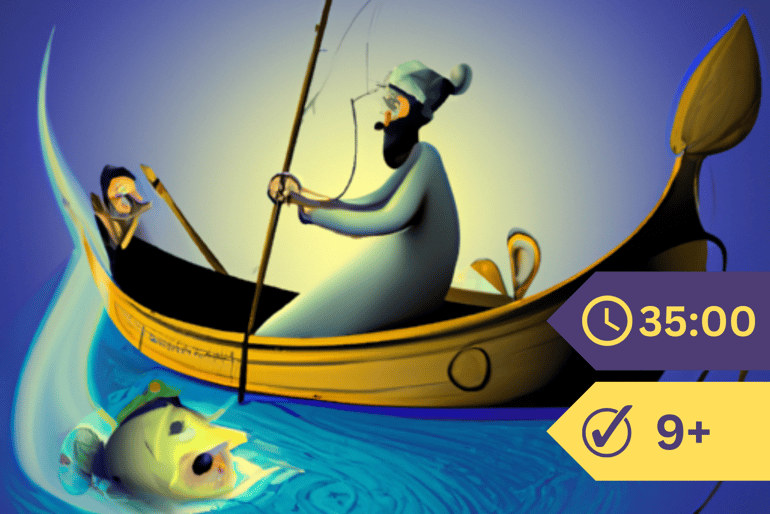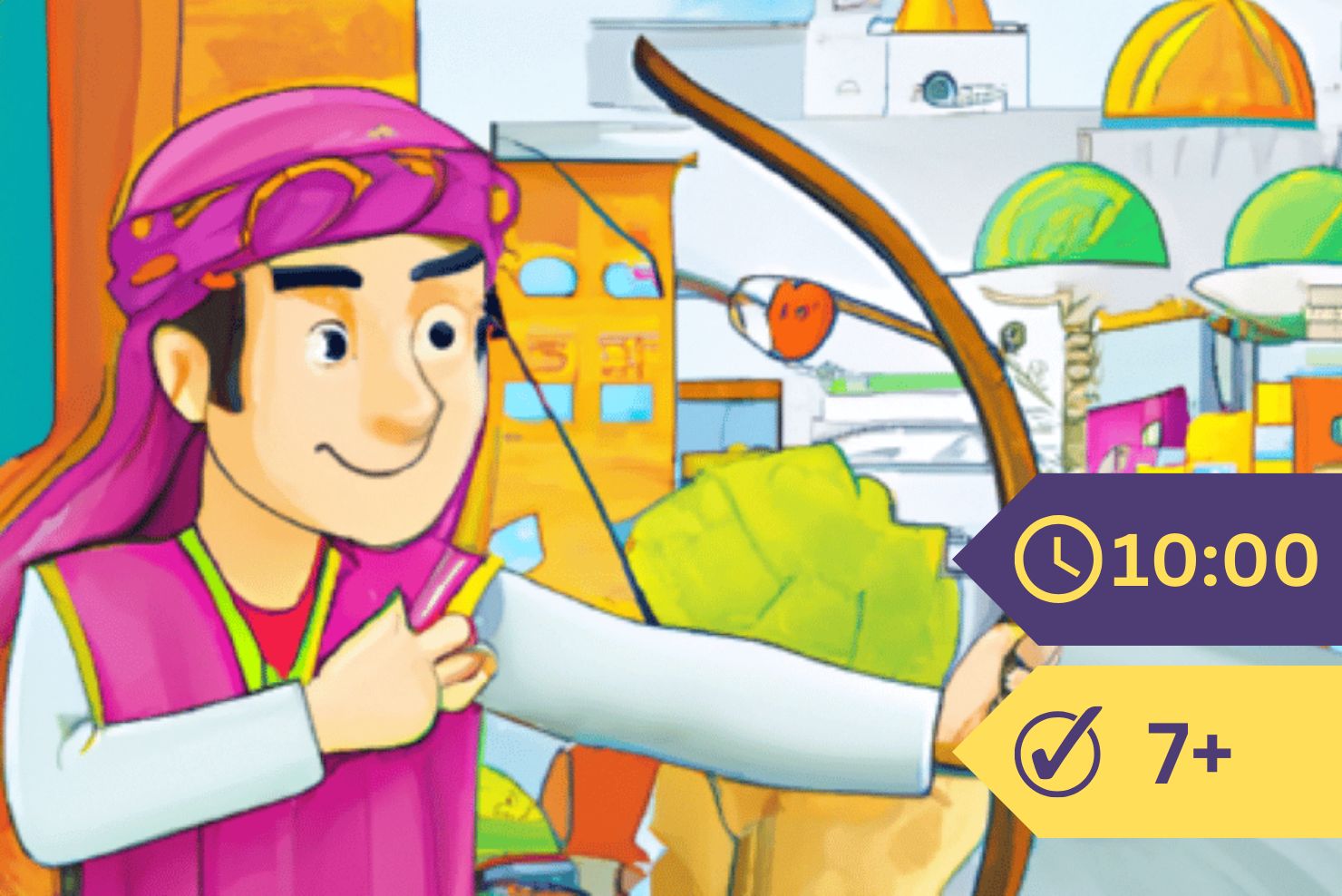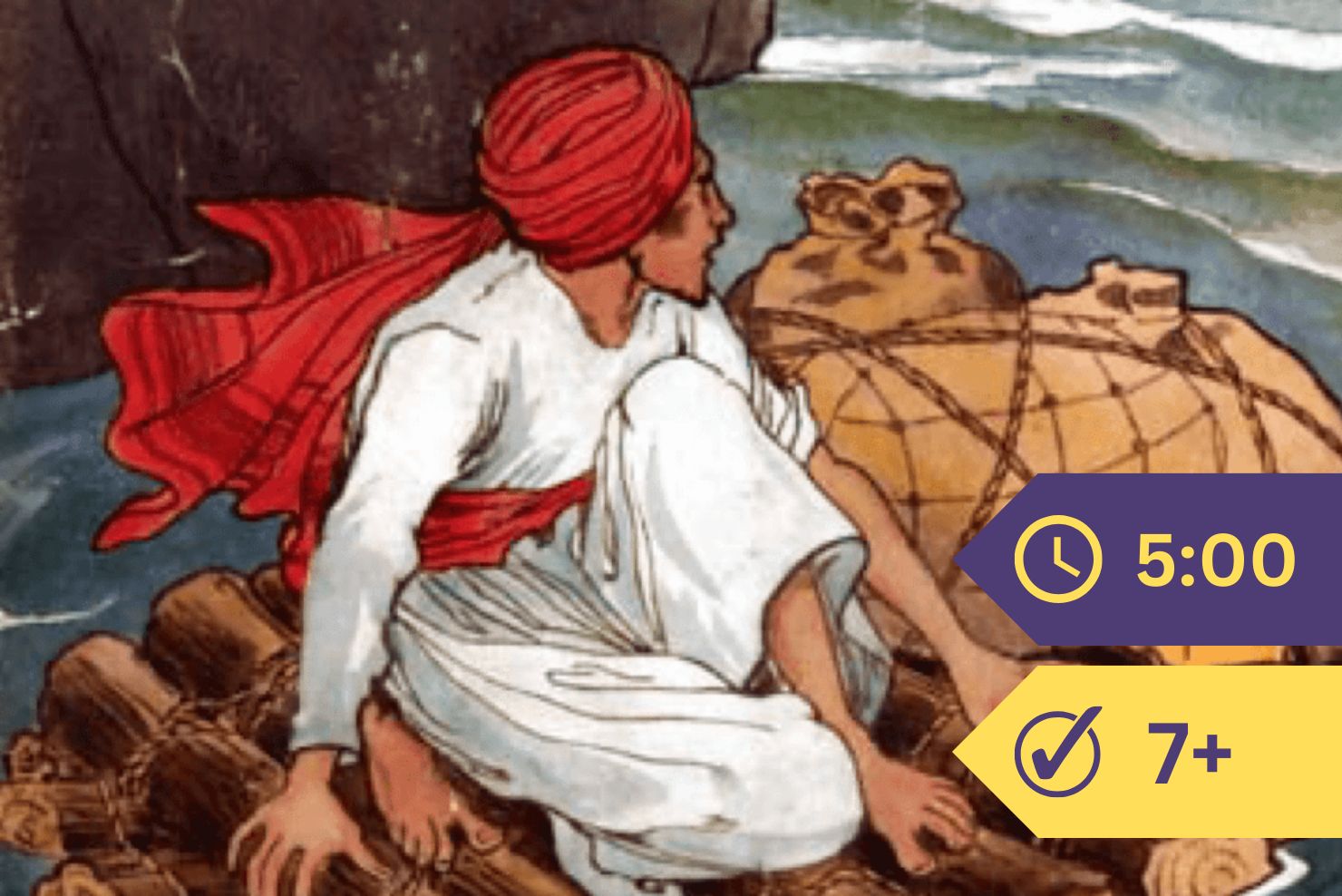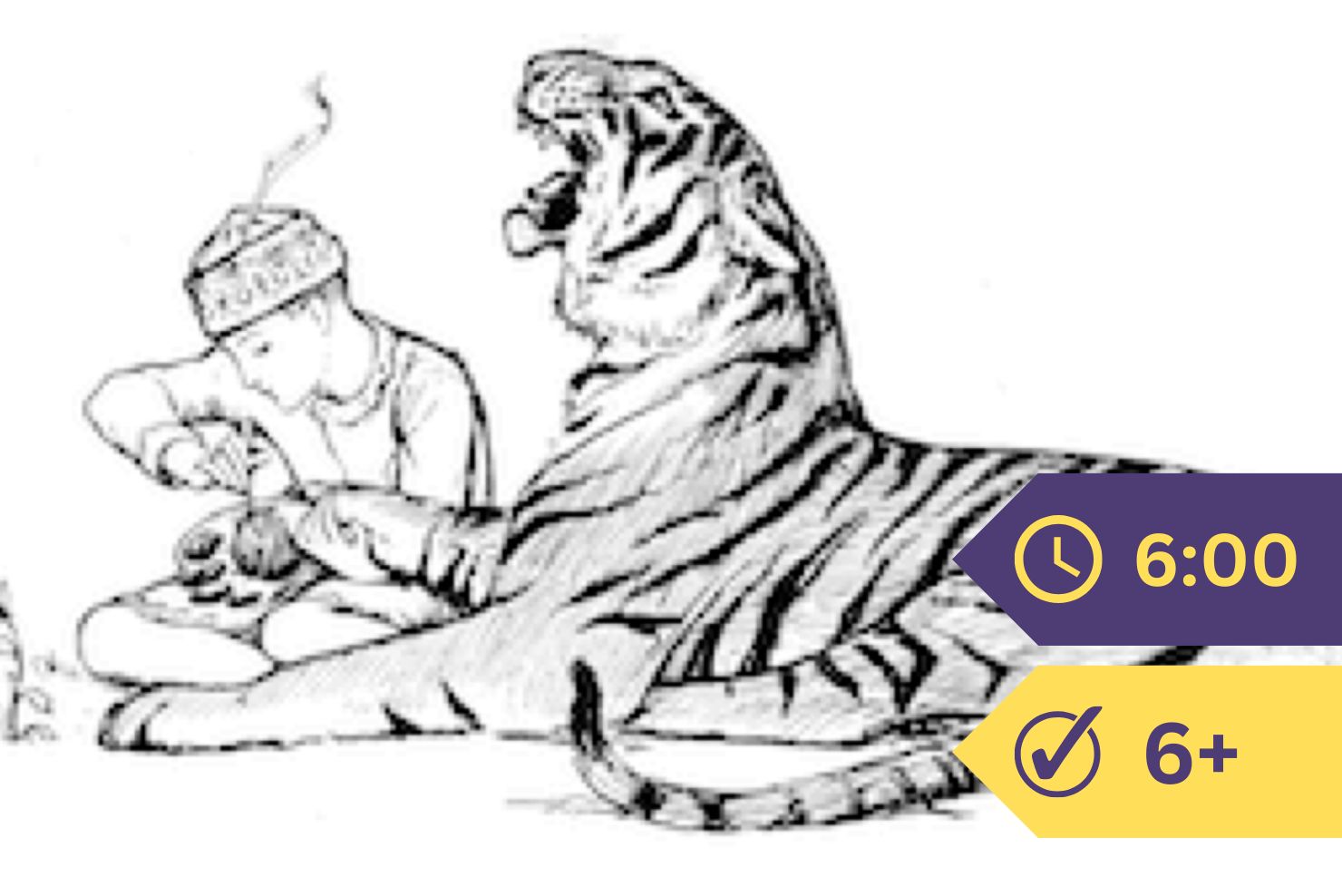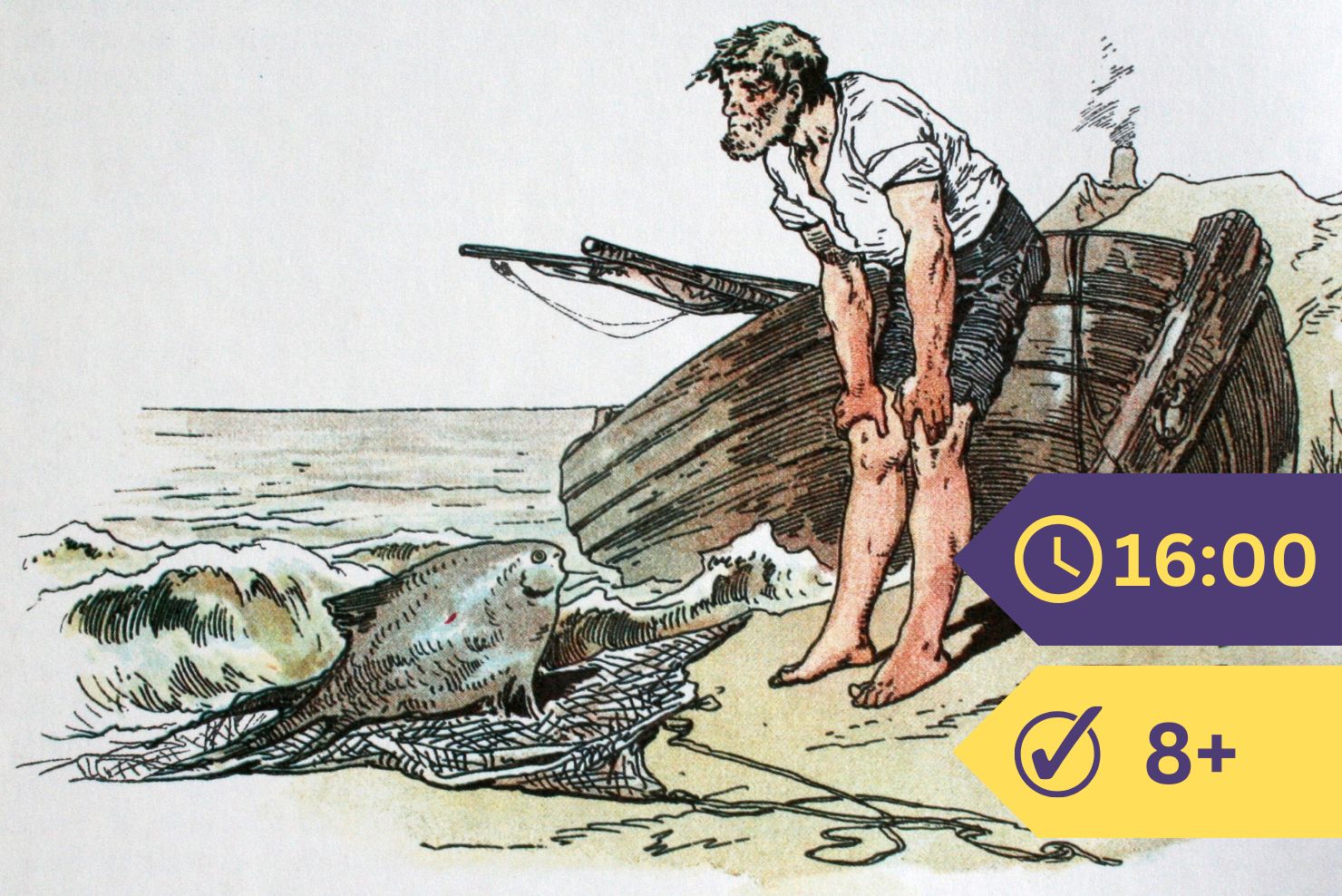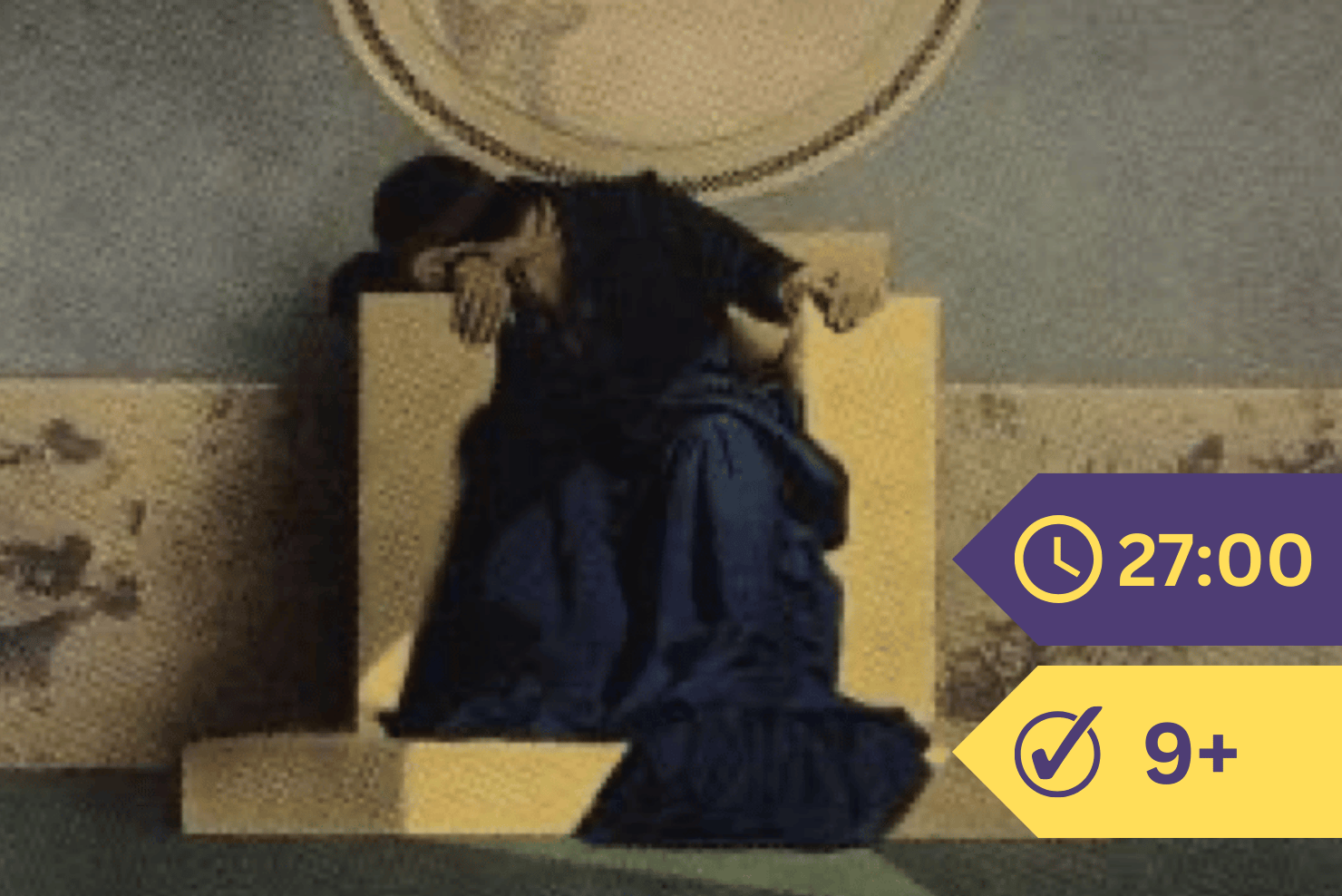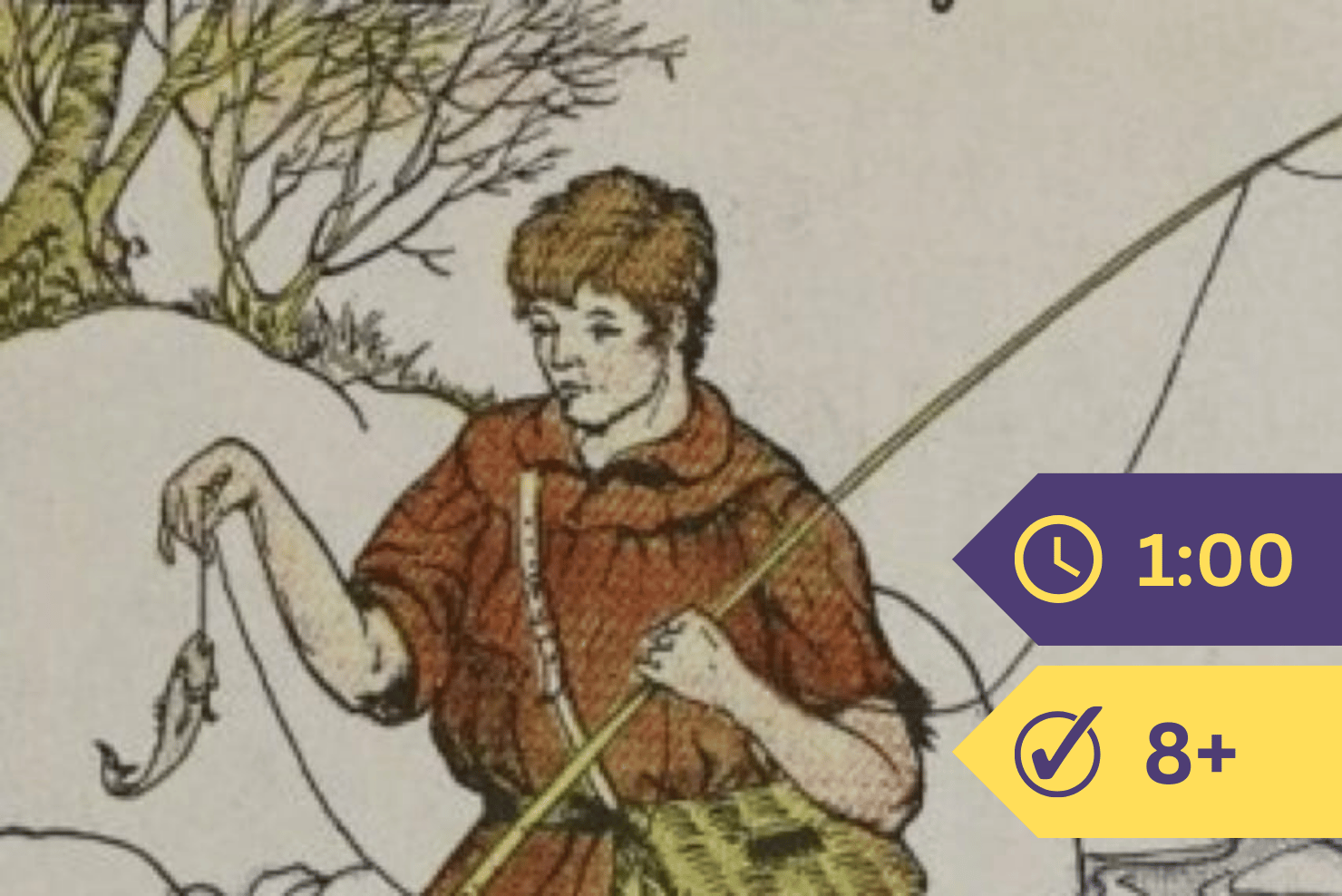Once upon a time, there was an old fisherman who was so poor that he could hardly earn enough to support himself, his wife, and three children. He went fishing early every morning and imposed a rule on himself that he could only cast his nets four times a day.
One morning, by moonlight, he went to the shore. He undressed and cast his nets into the sea. When he pulled them to the shore, he found them to be very heavy and thought he had had a good catch. He was, of course, delighted. But a moment later, when he noticed that instead of fish, his nets contained nothing but the carcass of a donkey, he became very angry.
After repairing his nets, which had been broken in several places by the donkey’s carcass, he cast them into the water a second time. When he pulled them up, he noticed a lot of resistance, which made him think he had caught an abundance of fish. But once again, he found nothing but a basket full of rocks and slime. This time, he was truly saddened.
“Oh Fortune!” he exclaimed, in a mournful tone, “do not be angry with me and do not pursue a wretch who prays to you to spare him. I came here to earn my living, and you pronounce a death sentence on me. I have no other trade to live by, and despite all my devoted care, I can hardly provide what is necessary for my family. I have reason to complain; you take pleasure in persecuting honest people and promoting those who have no virtue. You even commend them.”
After finishing his complaint, he threw the basket far away and cast his nets for the third time, after washing off the slime. But this catch brought nothing but stones, shells, and mud. No language could express how disappointed he was this time.
But at the end of the day, he did not forget to say his prayers as a good Muslim. He added this request: “Lord, you know that I only cast my nets four times a day; I have already cast them three times without the slightest reward for my labor. I can only cast them into the sea one more time. I pray to you to make the sea favorable to me, as you did for Moses.”
After the fisherman finished his prayer, he cast his nets for the fourth time. When he thought it was the right moment, he pulled them in, again with great effort. But instead of fish, there was nothing in them but a vessel of yellow copper that did not seem to be empty due to its weight. The fisherman noticed that it was attached with lead and sealed with an imprint of a seal. This turn of Fortune delighted him: “I will sell it,” he said, “and with the money, I will buy wheat.”
He examined the vessel from all sides and shook it to see if the contents made any sound, but he heard nothing. This, and the seal on the cover, made him think that there was something precious inside.
So he took a knife and opened the vessel without much difficulty. He turned the opening downward, but nothing came out, which surprised him greatly. He put it down, but as he looked at it attentively, a thick cloud of smoke suddenly emerged, which forced him to take two or three steps back.
The smoke rose to the clouds, stretched out all along the sea and over the coast, and formed a great mist, which filled the fisherman with great amazement.
When the smoke had completely left the vessel, it gathered and formed a solid body from which a Genie was formed, twice the size of the biggest of giants. At the sight of such a monster, the Fisherman would have liked to have run away, but he was so afraid he could not move.
The smoke rose again to the clouds and stretched out over the sea and the coast, forming a great mist once again.
The Genie immediately called out, “Pardon, pardon, Solomon, Solomon, great prophet. I will never again go against your will, I will obey all your commands.”
When the Fisherman heard these words from the Genie, he regained his courage and said to him, “You proud Genie, what do you say? It has been over eighteen hundred years since the prophet Solomon died. Please tell me your history and how you were trapped in this vessel.”
The Genie turned to the Fisherman with a fierce gaze and said, “You must address me with more courtesy. Who are you to insult me by calling me a proud Genie? Speak to me with more respect, or I will kill you.”
“Ah!” replied the Fisherman, “why would you kill me? Haven’t I just given you your freedom, or have you forgotten my services already?”
“No, I remember,” said the Genie, “but that will not save your life: I can grant you only one favor.”
“And what is that favor?” asked the Fisherman.
“It is,” answered the Genie, “the favor of letting you choose in what way you want to die.”
“But how have I offended you?” asked the Fisherman. “Is that your reward for the service I have rendered you?”
“I cannot treat you differently,” said the Genie. “Just listen to my story and you will know the reason.”
“I am one of those rebellious genies who resisted the will of Solomon, the son of David. To avenge himself, Asaf was sent after me. He was the son of Barachia, the prime minister, and he came to arrest me. Asaf seized my person and brought me by force before the throne of his master.”
“Solomon ordered me to acknowledge his power and submit to his commands. I courageously refused and told him that I would rather expose myself to his wrath than swear allegiance as he demanded. To punish me, he locked me in this copper vessel. And so that I would not break out of my prison, he himself pressed on this leaden lid his seal engraved with the great name of God. Then he gave the vessel to one of the spirits who had surrendered, with the command to throw the vessel, with me inside, into the sea.”
“During the first hundred years of my captivity, I swore that if anyone would free me before the end of that period, I would make him rich, even after his death. But that century passed, and no one found me, so I could not perform that good deed.”
“During the second hundred years, I swore an oath that I would open all the treasures of the earth to anyone who could set me free. But this also was unsuccessful.”
“In the third hundred years, I promised that I would make my liberator a powerful prince and fulfill three requests from him every day, of any nature whatsoever. But this century passed just like the previous one. I remained in prison. Finally, angry because I was imprisoned for so long, I swore that if anyone would set me free, I would kill him without mercy and grant him no other favor than to let him choose the way of his death. And therefore, since you have freed me today, I give you that choice.”
This speech tormented the Fisherman exceedingly: “I am an unhappy man,” he cried, “to come hither at your call, and to be so gentle with one who is so ungrateful. I implore you to consider your injustice, and revoke such an unreasonable oath. Heaven will forgive you. If you spare my life, I will be your slave, and will serve you as long as I live.”
“No,” said the genie, “I must kill you.”
Then the Fisherman began to think of a stratagem. “If you must kill me,” he said to the genie, “give me at least a little time to say my prayers. I have my shroud to make, and my grave to dig. When they are ready, I will come and die before you.”
“You have permission,” said the genie, “but I doubt you will keep your word.”
The Fisherman, however, went to the shore, and when he had finished his prayer, threw his net, which he had brought with him, into the sea. He soon drew it up, and without any difficulty found in it a dead dog.
The Fisherman then put the dog’s mouth to his own, and blowing with all his might, shouted out, “Come forth, O Sultan! Come forth, that you may see what you little expect to witness!”
The genie came out immediately, and asked what he wanted. “You must know,” said the Fisherman, “that I am a master of the art of conjuring, and that I can call forth all sorts of spirits. Now, if you do not believe me, fetch me a large vase, and I will show you how quickly I can call a spirit.”
The genie, thinking he had met with a man who had some magical power, made a vase appear, and said to the Fisherman, “Take the vase, and tell me what you want of me.”
The Fisherman began by striking the vase with a stick. Then he spoke to it in a loud voice, saying, “Commander of the Faithful, I am your slave. I and the other slaves of the lamp.” At that moment the genie, accompanied by all his train, broke into a hearty laugh.
“Fisherman,” he said, “it is true that you have freed me from my enchantment, and I am grateful. Nevertheless, I must kill you. That is my law.”
“But I must tell you,” replied the Fisherman, “that I do not believe anything you say. Now, if you really were in that vase, how is it possible for you to be so large as to fill the whole sea and to stand upon it? Furthermore, I will not believe you, unless I see you go back into the vase.”
Thereupon the body of the genie dissolved, and turned into smoke, which extended itself along the sea-shore. Finally, when it was all collected together, it began to re-enter the vase, and continued to do so, until none of it remained outside. Then a voice was heard, which said to the Fisherman, “Well, unbelieving one, do you believe me now?”
Instead of answering, the Fisherman took the leaden cover and sealed the vase tightly. “Genie,” he said, “now it is my turn to ask for a favor. You must choose the manner of your death. I advise you to return to the sea, where you have been so long, and I will build a house on the shore, where I will warn all fishermen who come to cast their nets, to beware of such a wicked genie as you, who swore to kill the man that set him free.”
The Genie, furious at these words, struggled with all his might to free himself. But it was impossible, as the pressure of Solomon’s seal held him back. When he noticed that the Fisherman was on his side, he decided to conceal his anger. “Fisherman,” he said, “be careful not to do what you threatened, for what I said to you was only meant as a joke.”
“Oh Genie!” replied the Fisherman, “you who were just recently the greatest of all Spirits, and now are the least of them, your crafty words mean nothing, to the sea you shall return. If you have been there as long as you said, you can stay there until the day of judgment. I begged you, in God’s name, not to take my life, and you rejected my prayers. I am now obliged to treat you in the same way.”
The Genie tried his best to convince the Fisherman: “Open the vessel,” he said, “give me my freedom and I promise to satisfy you.”
“You are a traitor,” answered the Fisherman, “I would deserve to lose my life if I were foolish enough to trust you.”
“My good Fisherman,” answered the Genie, “I ask you again not to be guilty of such cruelty; remember that it is not good to take revenge, and on the other hand, it is commendable to do good for evil. Do not treat me as Imama, Ateca treated before.”
“And what did Imama, Ateca do?” asked the Fisherman.
“Ho!” cried the Genie, “if you want more information on that, then open the vessel. Do you think I can tell amusing stories in such a narrow prison? I will tell you as many as you want, but let me out first.”
“No,” said the Fisherman, “I will not let you out. It is pointless to talk about it any further. I will just throw you to the bottom of the sea.”
“Listen to me one more time,” cried the Genie. “I promise you not to do harm; no, far from it, I will show you a way to become extraordinarily rich.”
The hope of freeing himself from poverty prevailed in the Fisherman. “I could listen to you,” he said, “if any honor was given to your word. So swear to me, by the great name of God, that you will faithfully do what you promise, and I will open the vessel. I do not believe that you dare to break such an oath.”
The Genie swore to him, upon which the Fisherman immediately removed the cover from the vessel. At that moment, smoke rose up and the first thing the Genie did, after regaining his form, was to kick the vessel into the sea. This action disturbed the Fisherman. “Genie,” he said fearfully, “will you not keep the oath you just made?”
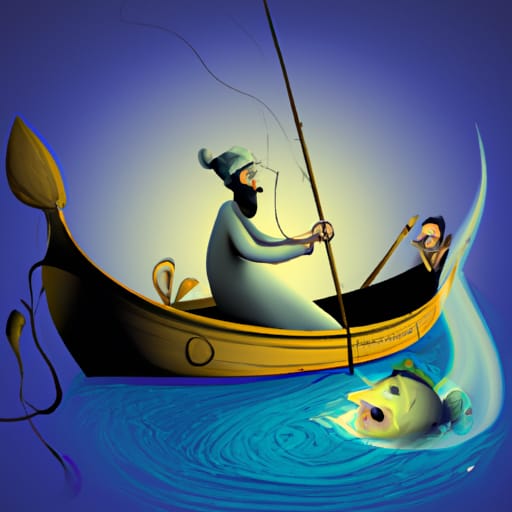
The Genie laughed at his fear and replied: “Fisherman, do not be afraid, I did it just to distract myself and to see if you would be afraid. But I will convince you that I mean it: grab your nets and follow me.” As he spoke these words, he walked ahead of the Fisherman. The Fisherman grabbed his nets and followed him, albeit with some suspicion. They passed through the town and climbed to the top of a mountain. From there, they descended into a vast plain, which led them to a lake situated between four hills.
When they reached the side of the lake, the Genie said to the Fisherman, “Cast your nets and catch the fish.” The Fisherman had no doubt about throwing a few, as he saw a large number of fish in the water. But he was extremely surprised when he discovered that they had four colors: white, red, blue, and yellow. He threw his nets into the water and brought out one fish of each color. Since he had never seen anything like it before, he could do nothing but admire them. He thought he could get a considerable amount for them, so he was very pleased. “Take those fish to your Sultan,” said the Genie to him, “he will give you a lot of money for them. You may come to fish in this lake every day, but I warn you not to cast your nets here more than once a day. Otherwise, you will regret it.” After speaking thus, the Genie struck his foot on the ground. The ground opened and, after swallowing him up, the ground closed again.
The Fisherman, determined to follow the advice of the Genie, refrained from casting his nets a second time and returned to the town very satisfied. On the way, he thought a thousand times about his extraordinary adventure. He immediately went to the palace of the Sultan to offer his fish, and His Majesty was very surprised when he saw the wonders the Fisherman offered. He picked them up one by one and examined them closely. After admiring them for a long time, he said to his advisor, “Take those fish, bring them to the cook, whom the Emperor of the Greeks has sent me. You cannot imagine that they are as good as they are beautiful.”
The advisor took them to the cook and said, “Four fish have just been brought to the Sultan. He commands you to prepare them.” Then he returned to the Sultan, who ordered him to give four hundred gold coins to the Fisherman.
The Fisherman, who had never seen so much money, could hardly believe his luck and thought it must all be a dream. Until he discovered that with the proceeds from his nets, he could provide for his family’s livelihood.
As soon as the cook of the Sultan had cleaned the fish, she put them on the fire, in a frying-pan with oil. When she thought they were baked enough on one side, she turned the fishes to the other side. But, oh monstrous wonder! Hardly had they been turned over when the kitchen wall split open and a young lady of marvelous beauty came through the opening. She held a rod in her hand and was dressed in flowered satin, with pendants in her ears, a necklace of large pearls and golden bracelets set with rubies. To the great astonishment of the cook, she walked up to the frying-pan, struck one of the fishes with the end of her rod, and said: “Fish, fish, are you doing your duty?” After the fish had given no answer, she repeated these words, and then the four fishes lifted up their heads and answered: “Yes, yes, if you reckon, we reckon; if you pay your debts, we pay ours; if you fly, we overcome, and are content.” As soon as they had spoken these words, the lady threw the frying-pan over and returned to the open part of the wall, which immediately closed and became as it was before.
The cook was extremely frightened by what had happened, and when she had somewhat recovered herself, she went to pick up the fishes that had fallen in the hearth. But they had become black as coal and were not suitable to be brought to the Sultan. This greatly distressed her, and she began to weep bitterly. “Alas!” she said, “what will become of me? If I tell the Sultan what I have seen, I am sure he will not believe me. He will become angry with me.”
While she was lamenting, the advisor came in and asked her if the fish was ready. She told him everything that had happened. Of course, it greatly surprised him. But without saying a word to the Sultan, he thought of an excuse that satisfied the Sultan. Then he immediately summoned the fisherman to ask him to bring four more such fish. The fisherman, without saying anything about what the Genie had told him, told the Sultan that he could arrange it without any problem. But he had to apologize, he could not bring them that day but the next day would certainly be possible.
Accordingly, the fisherman set out at night and came to the lake. He cast his nets the next morning, took four fish just like the previous ones, and brought them to the advisor. The advisor himself took them, carried them to the kitchen, locked himself in with the cook, cleaned them, and put them on the fire. When they were baked on one side and she had turned them to the other side, the kitchen wall opened again, and the same lady came in with her rod in her hand. She struck one of the fishes, spoke to it as before, and all four gave her the same answer.
After the young lady had spoken, she threw the frying-pan with her rod and withdrew into the wall. Now that the advisor had witnessed what had happened, he said, “This is too wonderful and extraordinary to remain hidden from the Sultan. I will inform him of this miracle.”
The Sultan, who was very surprised, immediately summoned the Fisherman and said to him, “Friend, can you bring me four more of such fish?” The Fisherman replied, “If Your Majesty gives me three days, I will do it.” After he was given his time, he went immediately to the lake. The first time he threw his net, he caught four fish and brought them straight to the Sultan. The Sultan was very pleased, as he had not expected them so quickly. He gave the Fisherman four hundred gold coins. As soon as the Sultan received the fish, he ordered them to be taken to his kitchen, and all the necessary preparations for baking were made. After he had locked himself in with his advisor, the cook cleaned them, put them in the pan, and when they were cooked on one side, turned them over to cook on the other. Then the wall of the kitchen opened again, but instead of the young lady, a black figure came out, dressed like a slave. He was gigantic and had a large green staff in his hand. He walked to the pan, touched one of the fish with his staff and said in a terrible voice, “Fish, do you fulfill your duty?” At these words, the fish lifted their heads and replied, “Yes, yes, we do; if you count, we count; if you pay your debts, we pay ours; if you fly, we overcome and are content.”
The fish had barely spoken these words when the black figure threw the pan into the middle of the kitchen, reducing the fish to ashes. After he had done this, he withdrew angrily and went back into the opening. The wall closed, and it looked the same as before.
“After what I have seen,” said the Sultan to the advisor, “it will not be easy for me. These fish undoubtedly mean something extraordinary.” He had the Fisherman brought back and said to him, “Fisherman, the fish you brought us makes me very uneasy; where did you catch them?” “My Lord,” he replied, “I fished for them in a lake situated between four hills, behind the mountain that we see from here.” “Do you know that lake?” the Sultan asked the advisor. “No,” the advisor replied, “I have never heard of it, although I have hunted behind that mountain for sixty years.” The Sultan asked the Fisherman how far the lake was from the palace. The Fisherman assured him that it was no more than three hours’ journey away. The Sultan ordered his entire court to saddle their horses and set out. The Fisherman served as their guide. They all climbed the mountain, and at its foot, to their great surprise, they saw an extensive plain with the lake. They also saw that it lay between the four hills, as the Fisherman had described. The water was so clear that they saw all the fish resembled those that the Fisherman had brought to the palace.
The Sultan stood on the shore of the lake, and after admiring the fish extensively, he asked his courtiers how it was possible that they had never seen this lake, which was so close to the city. They all answered that they had never heard of it.
“Because you all agree that you have never heard of it,” said the Sultan, “and since I am as amazed as you are, I am determined not to return to my palace until I know how this lake came here. I also want to know why all the fish in it have four colors.” After speaking thus, he ordered his court to set up their tents there. Immediately, his pavilion and the tents of his household were erected on the shores of the lake.
When night fell, the Sultan retreated to his pavilion and spoke to his advisor, saying: “My mind is restless. This lake is here, the black figure that appeared to us in my kitchen, and the fish that we heard speak. All these things stir my curiosity so much that I must know what is going on. For this, I am determined to withdraw alone from the camp, and I command you to keep my absence secret. Stay in my pavilion, and tomorrow morning, when the emirs and courtiers come to visit my dike, send them away and tell them that I am a little upset and want to be alone. Tell them the same for the following days until I return.”
The advisor tried to dissuade the Sultan from this plan. He pointed out the danger he could be exposed to, and that all his work might be in vain. But it was no use; the Sultan was determined. He put on a suit suitable for walking, and as soon as he noticed that everything was quiet in the camp, he went out alone and crossed the hills without much effort. The descent was even easier for him. When he reached the plain, he walked until the sun rose, and then he saw a large building in the distance. He rejoiced at the sight, hoping to receive the information he was looking for there. As he approached, he discovered that it was a beautiful palace, or rather a strong castle, of black polished marble and covered with fine steel, as smooth as glass. Since he was very pleased to have discovered something so quickly, he stopped in front of the castle and looked at it attentively.
Then he walked to the gate, one part of which was open. He would have preferred to go in right away, but he thought it best to knock first. He did this softly at first and waited some time. When he saw no one and assumed he was not heard, he knocked the second time, harder. Then he knocked again and again, but no one appeared, and he was extremely surprised. He could not imagine that this was a castle without inhabitants. “If no one is inside,” he said to himself, “then I have nothing to fear. If it is inhabited, I have means to defend myself.”
So he went inside, and when he entered the veranda, he called out, “Is there no one here to receive a stranger and offer some refreshment?” He repeated the same words two or three times, but although he spoke very loudly, he received no answer. The silence surprised him again. He came to a spacious courtyard but still saw no inhabitants.
When he saw no one, he entered the great halls. These were hung with silk carpets, the niches and sofas were covered with stuff from Mecca, and the porches were lined with the richest fabrics from India. Then he came to a magnificent salon, with a fountain in the middle, with a solid gold lion on each corner. The water came out of the mouths of the four lions, and as it fell, it formed diamonds and pearls.
The castle was surrounded on three sides by a garden, with flowers and shrubs, and to complete the beauty of the place, an infinite number of birds filled the air with their harmonious tones. The birds were always there, because nets were spread over the garden and attached to the palace to keep them captive. The Sultan walked through the entire castle. Tired from walking, he sat on a veranda overlooking the garden. While he was thinking about what he had seen, he suddenly heard a lamenting voice. He listened attentively and heard these words clearly: “Oh Fortune! You who would no longer want me to enjoy a happy fate, stop persecuting me and put an end to my sorrow through a speedy death. Alas! How is it possible that I am still alive after so many tortures that I have suffered!”
The Sultan stood up, walked to where he heard the voice, and saw a handsome young man. He was richly dressed and sat on a throne that was a little raised off the ground. Melancholy was painted on his face. The Sultan greeted him; the young man acknowledged his greeting with a nod of his head, unable to stand up. He said, “My Lord, I should stand up to receive you, but I am hindered by a sad situation, and therefore I hope you will not be offended. My Lord,” the Sultan replied, “I am very grateful that you think well of me. As for the reason why you do not stand up, whatever your excuse may be, I take it to heart. It grieves me and I offer you my help. It flatters me that you want to tell me the history of your misfortunes. But first, tell me about the meaning of the lake by the palace. Why do the fish have four colors? Whose castle is this? How did you come here? Why are you alone?”
Instead of answering these questions, the young man began to weep bitterly. “How fickle is Fortune!” he cried. “She likes to bring down those whom she has brought up. Where are those who peacefully enjoy the happiness they have from her, and whose day is always bright and serene?”
The Sultan, full of pity to see him in such a state, begged him to tell the cause of his excessive grief. “Alas! My Lord,” replied the young man, “how is it possible that I mourn and my eyes are inexhaustible fountains of tears?” At these words, he lifted his garment and showed the Sultan that he was only a man from his head to his waist, and that the other half of his body was made of black marble.
The Sultan was very surprised when he saw the pitiful condition of the young man. “What you show me,” he said, “fills me with horror, but also arouses my curiosity. I can’t wait to hear your story, which must undoubtedly be extraordinary. I am convinced that the lake and the fish are part of it; therefore, I ask you to tell me. You will find some comfort in it, for it is certain that the unfortunate find relief by making known their distress.” “I will not refuse your request,” replied the young man, “although I cannot comply without causing me grief again. But I tell you beforehand, you must prepare your ears, your mind, and even your eyes for things that surpass all that. Prepare yourself for things that you can only imagine.”

